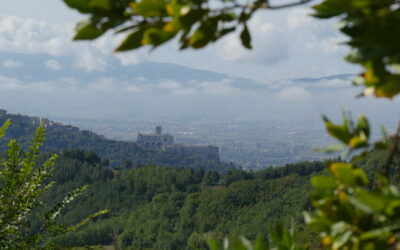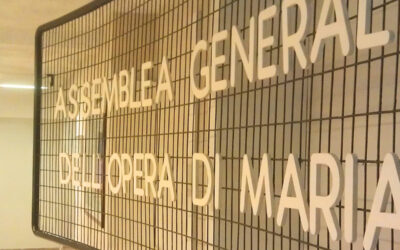 “We have witnessed a Prague Ecumenical Spring“. These words by the Romanian Orthodox bishop from Serbia, Daniil, express well the experience of intense communion, lived from the 20 to the 27 of September by 43 bishops from 18 churches and 17 nationalities of the four continents, convened in Prague, crossroads in the heart of Europe, for their 26th International Ecumenical Meeting. Next dates and locations: 2008 in Lebanon, with its ongoing tensions; 2009 in Wittenberg (Germany), the symbolic protestant town. The bishops concentrated – in the services and meditations during the meeting – on the actual historic shift with a conviction that the contemporary sufferings of humanity can lead the churches to an even greater commitment to bring the light of the Gospel in the world. “My Night has no Darkness: Beginnings of culture of the Resurrection” was the theme of the meeting, inspired by a lecture prepared by Chiara Lubich. In the final dialogue the bishops agreed that the challenge and wish to “live in the Light“, as expressed to them by the foundress of the Focolare Movement, was affirmed in the meeting.
“We have witnessed a Prague Ecumenical Spring“. These words by the Romanian Orthodox bishop from Serbia, Daniil, express well the experience of intense communion, lived from the 20 to the 27 of September by 43 bishops from 18 churches and 17 nationalities of the four continents, convened in Prague, crossroads in the heart of Europe, for their 26th International Ecumenical Meeting. Next dates and locations: 2008 in Lebanon, with its ongoing tensions; 2009 in Wittenberg (Germany), the symbolic protestant town. The bishops concentrated – in the services and meditations during the meeting – on the actual historic shift with a conviction that the contemporary sufferings of humanity can lead the churches to an even greater commitment to bring the light of the Gospel in the world. “My Night has no Darkness: Beginnings of culture of the Resurrection” was the theme of the meeting, inspired by a lecture prepared by Chiara Lubich. In the final dialogue the bishops agreed that the challenge and wish to “live in the Light“, as expressed to them by the foundress of the Focolare Movement, was affirmed in the meeting.  The Ecumenical Sunday celebrated in the Czech Republic on September 23, was the culmination of a week rich in meetings, reflections, visits to a variety of Christian communities and excursions to artistic and cultural treasures of Prague. In the Centre dedicated to Mother Theresa of Calcutta, the bishops met four hundred public and ecclesial representatives of the city. Among them: Catholics, Orthodoxes, Lutherans, Evangelists, Methodists, Baptists, Old Catholics, Pentecostals, Hussits and members of the Church of the Brothers. “Europe has emerged from the 20th century with many outer and inner wounds – said in this occasion Christian Krause, former president of the Lutheran World Federation, and – while still in office – signatory of the Joint Declaration between the Roman Catholic and the Lutheran churches on the Justification – but God intervened”. In his remarks he remembered, beside the “Velvet Revolution” and the fall of the Berlin Wall, the signing of this 1999 Augsburg Declaration, which removed a centuries-old barrier between the two denominations. An example is the commitment for reconciliation and for a common witness of the Christians, without rivalry spirit, in the post-communist society, expressed by the President of the national Ecumenical Council of Churches, Dr. Pavel Černý, and the catholic bishop of Pilsen, František Radkovský. The testimony of a number of bishop-participants on the topic of communion, which unites them in mutual love with “Christ in their midst“, was met by a long applause. Anglican bishop David Murray from Perth commented: “On my return to Australia I will keep other churches in my heart and continue hand in hand with other bishops“. “We experience a ‘dialogue of life‘ – Cardinal Vlk, archbishop of Prague and promoters of the Meeting, pointed out – “focusing on the realities we share, starting with baptism.
The Ecumenical Sunday celebrated in the Czech Republic on September 23, was the culmination of a week rich in meetings, reflections, visits to a variety of Christian communities and excursions to artistic and cultural treasures of Prague. In the Centre dedicated to Mother Theresa of Calcutta, the bishops met four hundred public and ecclesial representatives of the city. Among them: Catholics, Orthodoxes, Lutherans, Evangelists, Methodists, Baptists, Old Catholics, Pentecostals, Hussits and members of the Church of the Brothers. “Europe has emerged from the 20th century with many outer and inner wounds – said in this occasion Christian Krause, former president of the Lutheran World Federation, and – while still in office – signatory of the Joint Declaration between the Roman Catholic and the Lutheran churches on the Justification – but God intervened”. In his remarks he remembered, beside the “Velvet Revolution” and the fall of the Berlin Wall, the signing of this 1999 Augsburg Declaration, which removed a centuries-old barrier between the two denominations. An example is the commitment for reconciliation and for a common witness of the Christians, without rivalry spirit, in the post-communist society, expressed by the President of the national Ecumenical Council of Churches, Dr. Pavel Černý, and the catholic bishop of Pilsen, František Radkovský. The testimony of a number of bishop-participants on the topic of communion, which unites them in mutual love with “Christ in their midst“, was met by a long applause. Anglican bishop David Murray from Perth commented: “On my return to Australia I will keep other churches in my heart and continue hand in hand with other bishops“. “We experience a ‘dialogue of life‘ – Cardinal Vlk, archbishop of Prague and promoters of the Meeting, pointed out – “focusing on the realities we share, starting with baptism.  Without ignoring difficulties that there are within and between churches, we are convinced that through the evangelical love and above all through love for Jesus crucified and forsaken, this gives us the strength to build the communion, there where we do live.” The main theme of the afternoon programme was the contribution of Christians in the process of the unification of Europe, as discussed in two previously held fora: the 3rd European Ecumenical Assembly in Sibiu (Romania), organised in early September by European churches (Council of European Bishops‘ Conferences- CCEE, and Conference of European Churches- CEC) and attended by 3000 participants, and the 2nd meeting of Christian Movements and Communities entitled “Together for Europe” held in Stuttgart (Germany) on 12th May 2007. During the weekly program the bishops had the opportunity to listen to the testimonies of priests and lay people, who have lived according to the spirituality of the Focolare movement during times of persecution (some since 1960s‘), and have supported the Church in former Czechoslovakia by spreading the life of the Gospel.
Without ignoring difficulties that there are within and between churches, we are convinced that through the evangelical love and above all through love for Jesus crucified and forsaken, this gives us the strength to build the communion, there where we do live.” The main theme of the afternoon programme was the contribution of Christians in the process of the unification of Europe, as discussed in two previously held fora: the 3rd European Ecumenical Assembly in Sibiu (Romania), organised in early September by European churches (Council of European Bishops‘ Conferences- CCEE, and Conference of European Churches- CEC) and attended by 3000 participants, and the 2nd meeting of Christian Movements and Communities entitled “Together for Europe” held in Stuttgart (Germany) on 12th May 2007. During the weekly program the bishops had the opportunity to listen to the testimonies of priests and lay people, who have lived according to the spirituality of the Focolare movement during times of persecution (some since 1960s‘), and have supported the Church in former Czechoslovakia by spreading the life of the Gospel. Another spiritually profound moment was the visit paid to the Cathedral on Saturday afternoon where Catholic mass was celebrated in the historical chapel of Saint Wenceslas. The bishops commemorated the saints and martyrs from the historical beginnings of the Czech peoples and outstanding individuals from the Nazi and Communist eras resolving, both in their private lives and in that of their churches, to recognize the face of Jesus crucified and renew their love for Him, the only One who can bring the christians together to the so longed communion.
Another spiritually profound moment was the visit paid to the Cathedral on Saturday afternoon where Catholic mass was celebrated in the historical chapel of Saint Wenceslas. The bishops commemorated the saints and martyrs from the historical beginnings of the Czech peoples and outstanding individuals from the Nazi and Communist eras resolving, both in their private lives and in that of their churches, to recognize the face of Jesus crucified and renew their love for Him, the only One who can bring the christians together to the so longed communion.
Take a sense of family everywhere
Take a sense of family everywhere




0 Comments